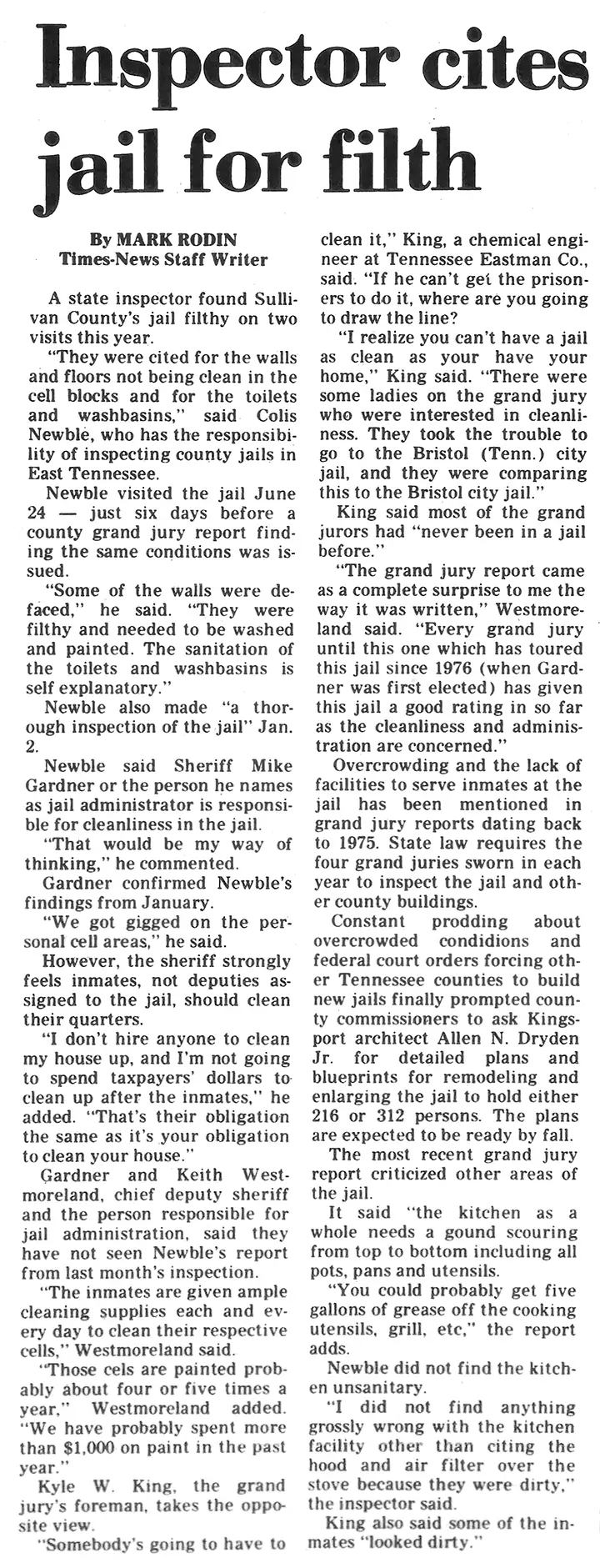Inspector Cites Jail for Filth
A state inspector found Sullivan County’s jail filthy on two visits this year.
“They were cited for the walls and floors not being clean in the cell blocks and for the toilets and washbasins,” said. Colis Newble, who has the responsibility of inspecting county jails in East Tennessee.
Newble visited the jail June 24 — just six days before a county grand jury report finding the same conditions was issued.
“Some of the walls were defaced,” he said. “They were filthy and needed to be washed and painted. The sanitation of the toilets and washbasins is self explanatory.
Newble also made “a thorough inspection of the jail” Jan. 2.
Newble said Sheriff Mike Gardner or the person he names as jail administrator is responsible for cleanliness in the jail.
“That would be my way of thinking,” he commented.
Gardner confirmed Newble’s findings from January.
“We got gigged on the personal cell areas,” he said.
However, the sheriff strongly feels inmates, not deputies assigned to the jail, should clean their quarters. .
“I don’t hire anyone to clean my house up, and I’m not going to spend taxpayers’ dollars to clean up after the inmates,” he added. ‘‘That’s their obligation the same as it’s your obligation to clean your house.”
Gardner and Keith Westmoreland, chief deputy sheriff and the person responsible for jail administration, said they have not seen Newble’s report from last month’s inspection.
“The inmates are given ample cleaning supplies each and every day to clean their respective cells,’ Westmoreland said.
“Those cells are painted probably about four or five times a year,” Westmoreland added.
“We have probably spent $1,000 on paint in the past year.”
Kyle W. King, the grand jury’s foreman, takes the opposite view.
“Somebody’s going to have to clean it,” King, a chemical engineer at Tennessee Eastman Co., said. “If he can’t get the prisoners to do it, where are you going to draw the line?”
“I realize you can’t have a jail as clean as your have your home,” King said. “There were some ladies on the grand jury who were interested in cleanliness. They took the trouble to go to the Bristol (Tenn.) city jail, and they were comparing this to the Bristol city jail.”
King said most of the grand jurors had “never been in a jail before.”
“The grand jury report came as a complete surprise to me the way it was written,” Westmoreland said. “Every grand jury until this one which has toured this jail since 1976 (when Gardner was first elected) has given this jail a good rating in so far as the cleanliness and administration are concerned.”
Overcrowding and the lack of facilities to serve inmates at the jail has been mentioned in grand jury reports dating back to 1975. State law requires the four grand juries sworn in each year to inspect the jail and other county buildings.
Constant prodding about overcrowded conditions and federal court orders forcing other Tennessee counties to build new jails finally prompted county commissioners to ask Kingsport architect Allen N. Dryden Jr. for detailed plans and blueprints for remodeling and enlarging the jail to hold either 216 or 312 persons. The plans are expected to be ready by fall.
The most recent grand jury report criticized other areas of the jail.
It said “the kitchen as a whole needs a gound scouring from top to bottom including all pots, pans and utensils.
“You could probably get five gallons of grease off the cooking utensils, grill, etc,” the report adds.
Newble did not find the kitchen unsanitary.
“I did not find anything grossly wrong with the kitchen facility other than citing the hood and air filter over the stove because they were dirty,” the inspector said.
King also said some of the inmates “looked dirty.”


